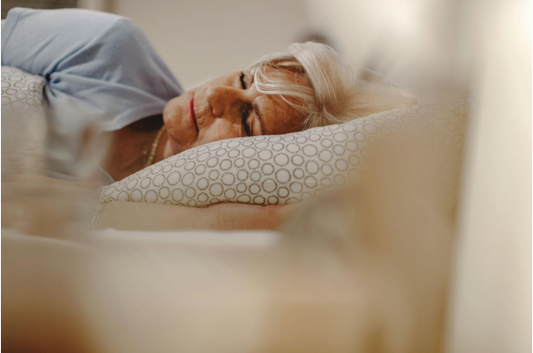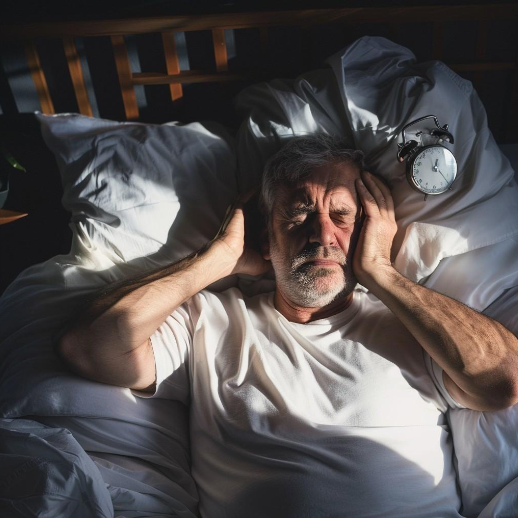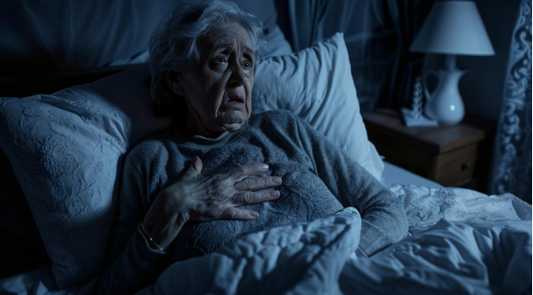Quality sleep can often be elusive for older adults, yet getting the right amount of rest is crucial for health and well-being. As we age, changes in sleep patterns and increased sensitivity to disruptions can make it hard to get a good night's rest. That's where sleep hygiene steps in, offering practical approaches to improve sleep quality. Seniors grappling with restless nights might find solace in strategies like maintaining a consistent sleep schedule, creating a calming bedtime routine, and making your sleeping environment comfortable. By adopting these simple yet effective habits, you can pave the way for better sleep and a healthier life.
What is Sleep Hygiene?
Sleep hygiene might sound like we're talking about cleaning your bedding, but it's so much more than that. It's about creating the right environment and habits to help you get a good night's sleep. We've all had those nights where it feels like sleep is playing hide and seek with us, especially as we get older. That's where understanding sleep hygiene can come in handy. You might be wondering, "What kind of things should I be doing to improve my sleep?" Let's break it down into some key steps.
Key Components of Sleep Hygiene
Good sleep hygiene is all about making thoughtful choices that encourage restful sleep. Many of these practices are simple yet powerful. Here's a look at the essential components:
- Consistent Sleep Schedule
- Comfortable Sleep Environment
- Mindful Eating and Drinking
- Limit Screen Time Before Bed
- Develop a Relaxing Bedtime Routine
- Stay Active During the Day
By focusing on these components, you can train your body and mind to embrace sleep more naturally. Implementing these practices might be just the fix you need to make sleepless nights a thing of the past. Remember, you're setting the stage for a good night's rest!
Practical Steps to Improve Sleep Hygiene
Isn't it frustrating when you can't seem to get a good night's sleep? Sleep is crucial for our well-being, especially as we age. It's like a magic potion that keeps us bright and alert during the day. For older adults, having good sleep hygiene is key to restful nights. Here are some practical steps to help you achieve better sleep.
Establishing a Consistent Sleep Schedule
Consistency is more than just a buzzword when it comes to sleep. Going to bed and waking up at the same time every day helps regulate your body's internal clock. Think of your body as a train on a schedule; sticking to a routine keeps everything running smoothly. No more confusion or missed stops along the way!
- Wake up at the same time daily, even on weekends.
- If you struggle to fall asleep, avoid afternoon naps.
- Consider setting a gentle alarm to remind you of bedtime.
Creating a Relaxing Bedtime Routine
Creating a bedtime routine is your personal lullaby that signals your body it's time to wind down. Activities that calm your mind and body are like the soothing notes of a lullaby before you slip into slumber.
Here are some soothing activities to try:
- Read a book: Let your imagination wander through the pages.
- Take a warm bath: Ease your muscles and melt away stress.
- Try gentle stretching: It's like giving yourself a big hug.
-
Practice deep breathing or meditation: Feel your worries float away.
Optimizing the Sleep Environment
Your bedroom should be a sanctuary for rest, almost like a cozy cave where all distractions are left at the door. Comfort is key, and the right environment can help you fall asleep quicker and stay asleep longer.
- Use blackout curtains to keep the room dark.
- Minimize noise with earplugs or white noise machines.
- Set the thermostat between 65 to 68 degrees Fahrenheit for optimal comfort.
Mindful Eating and Drinking
What you eat and drink can hugely affect how well you sleep. If you think of your body as an engine, what you fuel it with makes a big difference. Eating mindfully ensures nothing keeps you up when you're ready to catch those Zs.
- Avoid heavy meals, caffeine, and alcohol close to bedtime.
- Limit liquids in the evening to prevent late-night trips to the bathroom.
- Try a light snack like a banana or a warm glass of milk if you're a little hungry.
By integrating these practical steps into your daily routine, you can improve your sleep hygiene and enjoy more restful nights. Remember, prioritizing sleep is investing in your health and happiness. Sweet dreams!
The Impact of Lifestyle on Sleep Quality
As we age, our sleep patterns often change, leaving many older adults tossing and turning in search of restful slumber. While various factors can play a role in these sleepless nights, lifestyle choices hold significant sway over our snooze quality. Let's explore how daily activities and mindset techniques can pave the way to more peaceful nights.
Physical Activity and Sleep
Ever notice how a day of yard work or a brisk walk makes you feel ready to hit the hay? There's a good reason for this. Regular physical activity is a boon for your sleep quality. Here’s why:
- Boosts Sleep Duration: Engaging in regular exercise helps increase your total sleep time, offering more opportunities for your body to recover and recharge.
- Improves Deep Sleep: Exercise promotes slow-wave sleep, a dreamless stage where our bodies rebuild and rejuvenate.
- Reduces Sleep Latency: Struggling to drift off? A little daily movement can help you fall asleep faster, minimizing those frustrating stints of staring at the ceiling.
But remember, timing matters. Avoid vigorous exercise close to bedtime as it might leave you feeling too energized to sleep. Instead, aim for morning or early afternoon workouts to sync your body with a natural sleep schedule.
Cognitive Behavioral Strategies
Sometimes, it's not just our bodies that need a workout—our minds do too. Stress and anxiety can quickly turn into the antagonists of good sleep. But with
cognitive-behavioral strategies, you can manage your thoughts and get back to sleep mode.
- Challenge Sleep Anxieties: Ever worry you'll never fall asleep? Start by questioning these thoughts. Ask yourself, "What's the worst that could happen?" and "Have past sleepless nights ended okay?" These reframing techniques can lessen anxiety.
- Establish a Worry Time: Allocating specific times to address your worries can prevent them from consuming your bedtime. Try jotting down concerns during the day, freeing your mind come nightfall.
- Utilize Relaxation Techniques: Practices like deep breathing, guided imagery, or gentle yoga can ease tensions and prepare you for rest.
By reshaping how you perceive and respond to sleep-interfering stresses, you can make bedtime a more inviting and restful experience. Embrace these strategies to ensure your lifestyle supports not just your daily vitality but your nightly repose.
When to Seek Professional Help
For many older adults struggling to get a good night's sleep, it's important to know when to reach out for professional assistance. Sleep is a vital component of our overall health, and ignoring persistent issues can lead to more serious health concerns.
Whether you're experiencing occasional restless nights or more constant disruptions, understanding the common sleep disorders and recognizing when to seek professional help can make all the difference.
Common Sleep Disorders in Older Adults
As we age, our sleep patterns naturally change. However, there are specific sleep disorders that tend to affect seniors more frequently. Here's a quick rundown of some prevalent ones:
- Insomnia: This is probably the most well-known sleep disorder. It's not just about having trouble falling asleep but can also mean waking up too early or not feeling rested after sleep. For many seniors, insomnia might be tied to other health issues, stress, or medications.
- Sleep Apnea: Imagine you're trying to run a marathon, but every few steps, someone pulls the air away. Sleep apnea is kind of like that, but while you're sleeping. It involves breathing that repeatedly stops and starts, often leading to loud snoring and daytime fatigue.
-
Restless Leg Syndrome (RLS): Do you ever feel like bugs are crawling up your legs just as you're trying to relax? RLS causes uncomfortable sensations that create an uncontrollable urge to move your legs, mainly in the evening, which can make getting a good night's sleep tough.
- Circadian Rhythm Disorders: Our bodies run on a natural clock. For some seniors, this clock gets out of sync, often leading to feelings of sleepiness during the day and wakefulness at night.
Recognizing these disorders is the first step to addressing them. While some might find relief in simple lifestyle adjustments, others may need more structured treatment. If you've tried everything from adjusting your bedtime routine to cutting caffeine, and still find yourself tossing and turning, it might be time to see a professional.
No one needs to face sleep troubles alone, and addressing these issues head-on can lead to a more restful, healthier life. Keep in mind, when sleep hurdles seem insurmountable, reaching out for expert help is not just wise but essential.
Conclusion
For older adults, maintaining sleep hygiene is a vital part of improving sleep quality and overall health. By implementing simple strategies like setting a consistent sleep schedule, creating a relaxing bedtime routine, and managing dietary habits, you can enhance your sleep experience significantly.
These practical steps can make a real difference. It's time to take action—start with one tip and gradually incorporate more into your daily routine for better sleep.
Remember, the benefits extend beyond just feeling rested. Quality sleep can enhance mood, energy, and even cognitive function.
Try these steps and see for yourself. Sleep well and embrace the refreshed version of you. If you have any thoughts or experiences with these strategies, share them with us and help others find their path to quality sleep.
P.S.
If you are having difficulty with sleeping, you are not alone. There are many folks out there who want to know what the most effective natural sleep aid is to get them back to snoozing again. Fix My Sleep is a great resource for all those who have trouble sleeping and are looking for innovative tips and sleep products to help them get a good night’s sleep.





